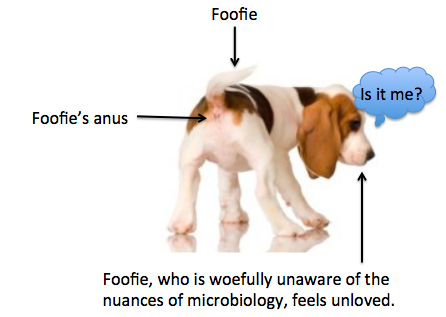Ask a bunch of New Yorkers about the worst thing that has happened to them that day. Most will say "I rode the 6 train," which if not created by Satan himself, comes damn close. Second place: "I found out I have a brain tumor."

Let's say that a guy who is crammed in a few inches from you leans over and licks your face. Even though New Yorkers aren't generally acknowledged as ardent devotees of Amy Vanderbilt's rules of etiquette, it is not unlikely that such an act would elicit a negative response from the recipient of the lick.
Yet, we routinely see people on the street stopping to play with strangers' dogs on the street, squealing in delight with each dose of slobber. What gives? Aren't these two revolting scenarios pretty much the same?
It is not uncommon to hear "dog saliva is cleaner than that of humans," as if this somehow makes the practice of playing tonsil hockey with a dyspeptic bulldog on 94th street acceptable while that action of the subway licker is not. But this rationale is incorrect. The pristine nature of dog saliva is a myth.
It's the type of germs, not the number of germs.
Human and dog saliva each contain about 400 species of bacteria, but the similarity ends there. The microbiome of human and dog saliva is very different.
“If you look at humans and dogs, we only saw about 15 percent that are the same species...[so], many of a dog’s mouth bacteria are less likely to be kept in check by our immune systems and native bacteria."
Floyd Dewhirst, DDS,PHD, a bacterial geneticist at the Forsyth Institute and professor of oral medicine at Harvard University
The "science" behind the myth.
Some of the myth of the "clean dog mouth" is based on a 1990 study in the journal Physiological Behavior, which examined whether there might be any benefit to licking
"Canine saliva was tested for its bactericidal effects against pathogens relevant to the presumed hygienic functions of maternal grooming of the mammary and anogenital areas and licking of wounds. Both female and male saliva were bactericidal against Escherichia coli and Streptococcus canis but only slightly..."
So what little benefit that canine saliva might be for dogs it's certainly going to have less (read: zero) for humans. But what else is in there? Here are a few bugs that can be transmitted from dog saliva to humans. (1)
- Pasteurella- An anaerobic bacteria (lives in the absence of oxygen) that can cause soft tissue infection, pneumonia, and sepsis (2).
- Capnocytophaga - A Gram-negative (3) bacteria commonly found in the saliva of dogs. Although it is usually harmless, in rare cases it can cause sepsis, which resulted in a Wisconsin man having his arms and legs amputated in 2018.
- Campylobacter - A bacteria that is one of the most common causes of food poisoning. A 2018 multistate outbreak of resistant Campylobacter was traced to puppies in a pet store.
- Rabies - A viral infection that attacks the central nervous system, is fatal almost 100% of the time if the infected person is not vaccinated before symptoms begin. Dogs are the most common carriers of rabies worldwide.
Keep in mind that getting these types of infections from a dog is very rare. Dogs have been licking faces for a long time and only rarely do we see amputations or rabies in the news. Perhaps this is an issue where science fails and the "ick factor" prevails.
The following is all *I* need to know:
“Hookworm and roundworm is transmitted from dog to dog when they ingest one another’s stool or lick each other’s anuses...and let’s be honest, we’ve totally seen that happen."
Sonia Batra, MD in Prevention
Yes, we have. So I'll leave you with some non-expert advice - unless you're perfectly comfortable with licking dog anuses perhaps you'll settle for simply petting Foofie's head the next time you see him walking by on 94th street. He won't mind. Probably.

NOTES:
(1) Transmission of these infections from dog to healthy humans are very rare; they are more of a concern to people with compromised immune systems. Infections are also more likely to be transmitted by a bite than a lick.
(2) Sepsis is a serious condition caused by pathogenic bacteria in the blood. If can lead to septic shock, which fatal about 50% of the time.
(3) Gram-negative bacteria are harder to kill because they have protein membrane surrounding the cell membrane.




